#Philip Coolidge
Explore tagged Tumblr posts
Text
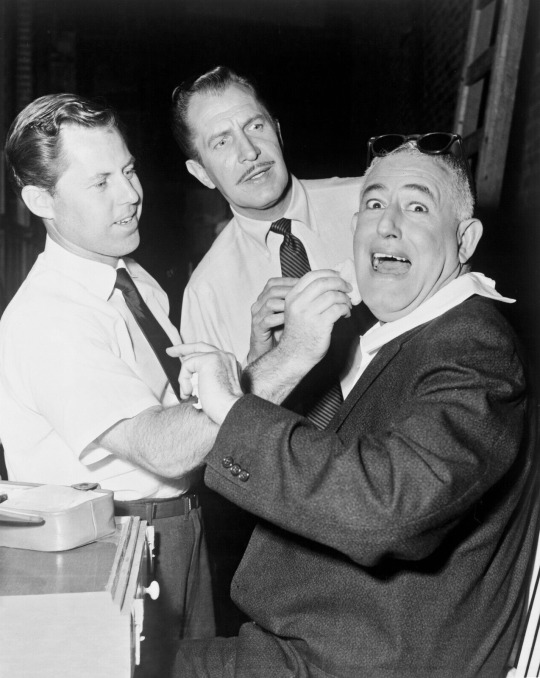

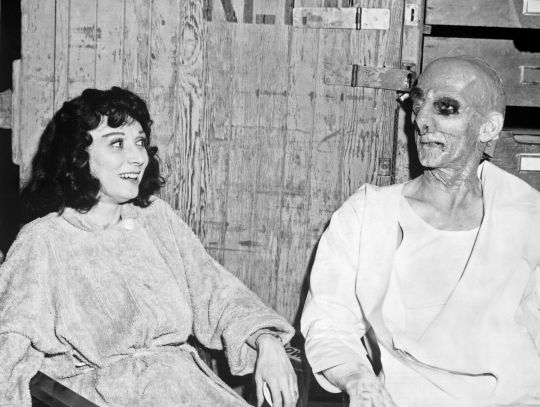
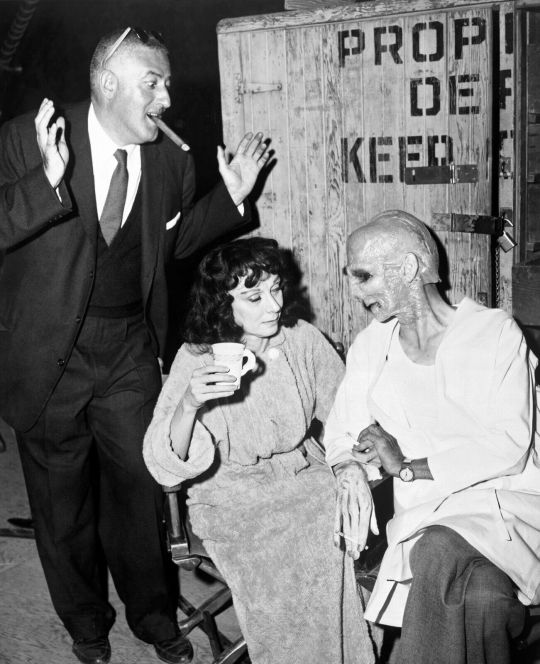
Behind the scenes of The Tingler (1959)
#the tingler#william castle#vincent price#judith evelyn#patricia cutts#philip coolidge#1950s horror#1950s movies#1959#classic horror#behind the scenes
120 notes
·
View notes
Text

























From the Golden Age of Television
The Signing of the Declaration of Independence - CBS - February 6, 1955
A presentation of "You Are There" Season Season 3 Episode 24 (It was also presented in Season 1 Episode 13 on April 26, 1953 with the same cast)
Historical Reenactment
Running Time: 30 minutes
Directed by Jack Gage
Produced by Charles W Russell
Narrated by Walter Cronkite
News Reporters:
Harry Marble
Ned Calmer
Stars:
Shepperd Strudwick as Thomas Jefferson
Addison Richards as Benjamin Franklin
Philip Coolidge as John Adams
Fred Herrick as Merchant
Frank Aletter as Quaker
Bart Burns as Loafer
Bruce Williamson as Tom
Gene Peterson as Bill
Scott Tennyson as Frontiersman
Tom McDermott as Gentleman
John Shay as Captain Graydon
Rusty Lane as Samuel Adams
Philip Abbott as Edward Rutledge
Vinton Hayworth as John Dickinson
Francis Bethencourt as John Hancock
#The Signing of the Declaration of Independence#TV#You Are There#Historical Reenactment#Walter Cronkite#1955#CBS#1950's#Shepperd Strudwick#Addison Richards#Philip Coolidge#Rusty Lane
3 notes
·
View notes
Audio
Coming to you in Percepto! It's THE TINGLER (1959) from William Castle! Starring Vincent Price, Judith Evelyn and Philip Coolidge, plus more gimmicks than you can shake a stick at, the film is Castle's third horror... can he keep up his quality of work?
The special music you hear in this episode is from creature of the night Chris Crewe and his band the Special Agents! You can find their music here: thespecialagents.bandcamp.com/
Context setting 00:00; Synopsis 35:52; Discussion 47:04; Ranking 1:11:18
#podcast#the tingler#william castle#robb white#vincent price#percepto#columbia pictures#wilfred m cline#chester schaeffer#von dexter#judith evelyn#lsd#darryl hickman#patricia cutts#pamela lincoln#philip coolidge#tol'able david#lysergic acid diethylamide
8 notes
·
View notes
Text

Bad movie I have North by Northwest 1959
#North by Northwest#Cary Grant#Eva Marie Saint#James Mason#Alfred Hitchcock#Jessie Royce Landis#Leo G. Carroll#Josephine Hutchinson#Philip Ober#Martin Landau#Adam Williams#Edward Platt#Robert Ellenstein#Les Tremayne#Philip Coolidge#Patrick McVey#Edward Binns#Ken Lynch#Stanley Adams#John Alban#Andy Albin#John Albright#Anne Anderson#Don Anderson#Ernest Anderson#Malcolm Atterbury
2 notes
·
View notes
Text
Apologies to Philip Coolidge, somehow I missed that he actually did three more Broadway musicals! Sing Out, Sweet Land (with Alfred Drake), Barefoot Boy with Cheek (starring 20-year-old William Redfield - I knew about that one but thought it was a play), and The Liar (directed by Alfred Drake, who also wrote the book). He seems to have sung only in the the last, and unfortunately there's no cast album.
The Cast of Hamlet (1964) in Musicals: Part 3
Alfred Drake (Claudius) was one of the most prominent leading men of the Golden Age of Broadway. He made his Broadway debut when he was only 20, in the ensembles of a few Gilbert and Sullivan shows in rep. At 22, he was in the original cast of Babes in Arms, and introduced the title song. Unfortunately, he doesn't seem to have recorded it. In 1943, at 28, he originated the role of Curly in Oklahoma!. Here he is recreating his performance of "Oh, What a Beautiful Mornin'" on TV in 1959:
youtube
In this mini concert, Drake takes the audience through his career, performing songs from Oklahoma!, Sing Out, Sweet Land, Kiss Me, Kate, and Kismet:
youtube
Speaking of Kiss Me, Kate, here's a full video of an abridged version of the show that Drake did for TV in 1958:
youtube
I love Kiss Me, Kate, a backstage musical about a dueling divorced couple in a musical adaptation of The Taming of the Shrew, but uh, warning for misogyny of both the Elizabethan and mid-1900s sorts.
And speaking of warnings, Kismet has some great songs but also it's set in medieval Baghdad and performed by white Americans, so, y'know. Not the most culturally sensitive piece. (Philip Coolidge (Voltimand/Captain) was also in the original cast! But that was in a non-singing role and I don't think he did any other musicals, so this will be his only appearance in this series.) Anyway, here's one of the songs not covered in the concert above:
youtube
Perhaps this is what Richard Burton was thinking of when he described Laurence Olivier's hand speech? :D
Kismet was not Drake's only foray into cultural insensitivity. He replaced Yul Brynner as the King of Siam in The King and I. And then there was Kean, a flop about Shakespearean actor Edmund Kean. The plot involved a production of Othello, and the album cover shows Drake in blackface. ...and I was going to say that's why I'm uploading a song instead of using YouTube, but Tumblr isn't letting me do that, so, sorry about the artwork:
youtube
This is the finale, where Kean crafts an apology using Shakespeare's words.
And this is a bootleg (songs only) of Drake starring in an adaptation of The Strange Case Of Dr. Jekyll And Mr. Hyde! I'd never heard of it before stumbling across this on YouTube, and I haven't listened yet, but I am intrigued. I mean, the title alone!
youtube
Drake's last Broadway musical was the stage adaptation of Gigi. He played the Maurice Chevalier role. Here he is with Maria Karnilova:
youtube
And finally, here he is actually onstage in a show! Gambler's Paradise, another one that I'd never heard of before exploring YouTube:
youtube
12 notes
·
View notes
Text






here's my pitch for the Greater Boston/Transformers crossover that is super obvious and not based on me mashing two of my niche interests together. Big shoutout to @banditposting for coming up with the names for the transformers and helping me brainstorm stuff
#greater boston#transformers#comic#uhhhh aha anyways. this IS based around gemma and phil working to help wonderland together and i forget how much abt that is confirmemd#gemma linzer-coolidge#philip west
53 notes
·
View notes
Text
"The housewife is a nobody," says Philip Slater, and almost everyone agrees. Her work is menial labor. Even more status-degrading is the unpaid nature of her job. Few deny the economic as well as the sociological importance of housework and homemaking. Housework is part of the great infrastructure on which, as David Riesman has reminded us, the entire superstructure of the economy and the government rests. If women did not supply the services of taking care of the living arrangements of workers, industry would have to do so, as in the case of lumber camps, ships, and the military. But housewives are not in the labor force. They are not paid for the services that they perform.
The low status of the wife's work has ramifications all through her marriage. Since her husband's work is not only higher in status but usually competitive, as hers is not, and he has to meet certain clothing and grooming standards or lose his job, his needs have to be catered to. If there has to be a choice, his new suit is more important than hers. This, quite apart from whatever personal or institutional prestige his work confers, tends to put him in a position of status superiority to the wife.
Housework is a dead-end job; there is no chance of promotion. One cannot grow in it. There is a saying that passes as wit to the effect that Washington is full of talented men and the women they married when they were young. The couple who began their marriage at the same stages of their development find themselves far apart in later years. "Persons who took the initiative in seeking divorce," Nelson Foote has noted, "in explaining their experience, and likewise observers of broken marriages, speak frequently of a mate's having outgrown the other. It is the husband who usually outgrows the wife." Not only does the wife not grow, but the nonspecialized and detailed nature of housework may actually have a deteriorating effect on her mind, as Mary Roberts Coolidge observed long ago, rendering her incapable of prolonged concentration on any single task. No wonder that after hours of passive, often solitary, absorption in television and radio soap operas, she comes to seem dumb as well as dull.
-Jessie Bernard, The Future of Marriage
355 notes
·
View notes
Text
Hatfield himself and a companion (unarmed and in the company of their wives) were gunned down and murdered by Baldwin-Felts gunmen on August 1, 1921, on the steps of the McDowell County, West Virginia, courthouse, where they had arrived to answer a trumped-up indictment. The gunmen were acquitted, claiming self-defense, although this claim seemed preposterous. The murder of Hatfield, already a hero to the miners, enraged mining communities throughout the state.
Armed miners began to pour out of the mountains to end the police state that kept them from organizing in the two counties. By August 24, 1921, more than ten thousand armed miners in Charleston, the state capital, were preparing to march. Labor marches throughout Appalachia had a long history, much like earlier revival meetings. Workers and their families would often rally, listen to speeches, and march for days, agitating in large areas on behalf of unions. As mine owner violence worsened, the marches became armed. Corbin claims that a conservative estimate of the number of armed coal miners who took part in the eventual march was between fifteen and twenty thousand. The miners were well organized, led by hundreds of miners who were World War I veterans. They had commissary, food support, and hundreds of medical personnel to take care of the wounded, and above all they had weapons, including numerous large machine guns seized from coal mine supplies. Corresponding to their proportions among miners in the state, roughly 25% of the marchers were African-American.
The main battle took place on Blair Mountain, where armed miners did battle with a private army led by Sheriff Don Chafin, the coal-company-financed dictator of Logan County. As the miners fought their way to Logan County, President Calvin Coolidge sent federal troops into West Virginia, allowing coal companies and their minions to destroy the union. Then–UMWA vice president, Philip Murray, claimed that if the army had not intervened, the state would have been rid of the mine gunmen. This is by no means certain, as Shogan argues. What is certain, however, is that the arrival of federal troops ensured that the miners and their union would suffer a monumental defeat. By the end of the decade, union membership in the state, which had been many tens of thousands, had dwindled to the hundreds. The spirit and remembrance of Blair Mountain, however, was a factor in making West Virginia coal miners among the first workers to mobilize and organize in the early 1930s.
Michael Goldfield, The Southern Key: Class, Race, and Radicalism in the 1930s and 1940s
9 notes
·
View notes
Text
I want so many actors/plots to be in knives out movies just for shits and giggles
Saw a post about if they ever showed who Benoit Blanca’s parents were and imo I feel like the only right answer is Ian McKellen and Patrick Stewart with southern accents
J.K Simmons and or Pierce Brosnan as a rival detective and their trying to solve the same case as Blanc
Any kind of story that involves Jennifer Coolidge and Martin short
I would love a all muppets knives out movie (imo the murderer would be miss piggy)
A knives out with all the Chris’s
Matthew Lillard or Bryan Cranston But as the villain of the story
Honestly more Marta,Philip,Helen scenes
#repost#celebrities#benoit blanc#knives out#j.k Simmons#pierce brown#ian mckellen#patrick stewart#Martin short#jennifer coolidge#matthew lillard#bryan cranston#all the Chris’s#Chris evans#chris hemsworth#Chris Pratt#Chris pine#muppets#murder mystery#glass onion#Marta#Helen#Phillip
17 notes
·
View notes
Text
A Writer’s Diary by Toby Litt
On Not Writing
Isn’t it always better to write something rather than nothing?
JAN 7 2024
This morning I thought for some time about not writing.
Initially, it was just about spending the cold sunny hour reading instead of working on the novel. (Which is what I ended up doing.) But soon it turned into another question, broader, scarier.
Maybe I should take Sunday off every week, rather than seeing it as a chance to do rather more writing than I get done on the average Wednesday?
Or maybe, I should stop writing for a month or a year, because — in the longest run — that might be the best thing I could do to get better as a writer?
One of the books I’ve been reading recently (after seeing the great show at Tate Modern) is Philip Guston’s I Paint What I Want To See.
In conversation with the American poet Clark Coolidge, Guston says:
..art is the frustration of the desire not to make art, you know?
Although I agree with this, it’s not a statement I empathise with. My desire, it’s long been clear, is to make art of some sort all the bloody time. Just scribble some notes. Half a page.
Sundays. Christmas Days. Hospital waiting rooms.
With other forms of learning, there’s the chance for the artist to stand back and judge their effect. To compare one period with another.
I got a lot from copying Moby Dick by hand, say. It was a better use of my time than just reading it, or writing another short story. Or at least, that’s how it feels.
With not writing, as a way of productively lying fallow, of allowing deeply buried objects to surface, you’re never going to be sure.
Couldn’t you have just kept going? Isn’t it always better to write something rather than nothing?
Writers are said to be ‘blocked’, as if their blockage was what blues singer Robert Johnson called ‘stones in my passway’ — a painful obstruction, either medical or in the road they hoped to drive.
The ideal, it seems, is to be regular and free flowing.
A few years ago, I’ve forgotten where, I read someone talking about making art. They gave this advice, Don’t treat yourself like a factory.
Yes, I thought, but also, Don’t treat yourself like a museum.
I spent the morning reading, but then I wrote this, and now I’m going to have a very quick look at the novel.
I’ll try not writing another time.
Or maybe I won’t. Too scary.
1 note
·
View note
Photo
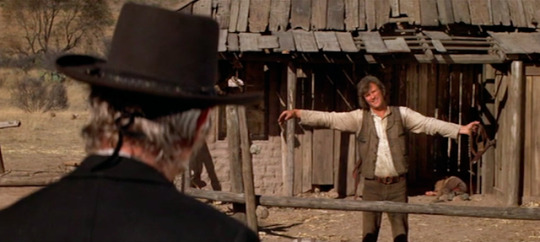
James Coburn and Kris Kristofferson in Pat Garrett and Billy the Kid (Sam Peckinpah, 1973) Cast: James Coburn, Kris Kristofferson, Bob Dylan, Richard Jaeckel, Slim Pickens, Katy Jurado, Chill Wills, Barry Sullivan, Jason Robards, R.G. Armstrong, Luke Askew, John Beck, Jack Elam, Rita Coolidge, Charles Martin Smith, Harry Dean Stanton. Screenplay: Rudy Wurlitzer. Cinematography: John Coquillon. Music: Bob Dylan. With its laid-back pace punctuated by moments of violence, not to mention its soundtrack by Bob Dylan, Pat Garrett and Billy the Kid may be the ultimate stoner Western*. After being mutilated by MGM -- the credits list six film editors -- it was savaged by critics on its first release, but the release on video of Sam Peckinpah's original preview version in 1988 caused a reevaluation of the film, with some now calling it a masterpiece. I wouldn't go that far: To my mind the narrative is still too elliptical and the inspiration -- rewriting a myth -- too commonplace. But it has moments of brilliance that transcend its flaws, such as the beautiful sequence of the death of Sheriff Baker (Slim Pickens), with its fine use of the iconic performers Pickens and Katy Jurado and the underscoring with Dylan's "Knockin' on Heaven's Door." James Coburn, always an underrated actor in his prime, is wonderful as Pat Garrett, and while Kris Kristofferson was never much of an actor, he and Coburn play well against each other. Dylan was no actor, either, but he's used well here as the enigmatic figure who lets himself be known as "Alias," and the scene in which Garrett forces him to read the labels of canned goods while he toys with other members of Billy's gang is nicely done. The gallery of character actors both old (Chill Wills, Jack Elam) and new (Charles Martin Smith, Harry Dean Stanton) is welcome. Its post-censorship era's exploitation of women -- there are an awful lot of bared breasts, though we also get a fleeting butt-shot of Kristofferson -- is overdone, and it certainly wouldn't earn any seal of approval from the American Humane Society after the scene in which live chickens are used for target practice.
*The huge success of Butch Cassidy and the Sundance Kid (George Roy Hill, 1969) spawned a lot of movies that took an irreverent look at the legend of the American Old West and were aimed at the younger countercultural audience. Most of them were seen as commentaries on American violence and the quagmire of the Vietnam War. They include such diverse films as Little Big Man (Arthur Penn, 1970), McCabe & Mrs. Miller (Robert Altman, 1971), The Great Northfield Minnesota Raid (Philip Kaufman, 1972), The Life and Times of Judge Roy Bean (John Huston, 1972), and Blazing Saddles (Mel Brooks, 1974).
6 notes
·
View notes
Text
Birthdays 10.23
Beer Birthdays
William Anderton (1866)
Warren Marti (1920)
Adam Nason (1984)
Five Favorite Birthdays
Johnny Carson; television talk show host (1925)
Michael Crichton; writer (1942)
Pele; Brazilian footballer (1940)
Ryan Reynolds; actor (1976)
"Weird" Al Yankovic; singer, parody songwriter (1959)
Famous Birthdays
Alexis Adams; pornstar (1992)
Laurie Halse Anderson; author (1961)
Nicholas Appert; chef, chemist, inventor (1752)
John Russell Bartlett; linguist & historian (1805)
Vasily Belov; Russian novelist, poet & playwright (1932)
Sarah Bernhardt; French actress (1844)
Pauline Black; English singer, actress (1953)
Felix Bloch; Swiss physicist (1905)
Robert Bridges; English writer (1844)
Jim Bunning; Philadelphia Phillies P (1931)
Pieter Burman the Younger; Dutch philologist, poet (1713)
Augusten Burroughs; writer (1965)
Dolly Buster; Czech film director, actress & author (1969)
Trudi Canavan; Australian author & illustrator (1969)
Johnny Carroll; rockabilly musician (1937)
Emilia Clarke; English actress (1986)
Benjamin Constant; French writer (1767)
William David Coolidge; chemist, x-ray tube inventor (1873)
James Daly; actor (1918)
Cat Deeley; English model, actress (1976)
Diana Dors; actor (1931)
Douglas Dunn; Scottish poet (1942)
Doug Flutie; CFL and NFL QB (1962)
Ilya Frank; Russian physicist (1908)
Coleen Gray; actress (1922)
Maggi Hambling; English sculptor & painter (1945)
Mike Harding; English singer-songwriter & comedian (1944)
Lawren Harris; Canadian painter (1885)
John Heisman; football coach (1869)
Philip Kaufman; film director (1936)
JacSue Kehoe; neuroscientist (1935)
Pierre Larousse; French lexicographer, encyclopedist (1817)
Ang Lee; Chinese film director (1954)
Juan Luna; Filipino painter & sculptor (1857)
Masiela Lusha; Albanian-American actress, poet (1985)
Bob Montana; illustrator (1920)
Richard Mortensen; Danish painter (1910)
Una O'Connor; Irish-American actress & singer (1880)
Simo Puupponen; Finnish writer (1915)
Sam Raimi; film director (1959)
Speckled Red; blues/boogie-woogie piano player (1892)
Dianne Reeves; jazz singer (1956)
Chi Chi Rodriguez; golfer (1936)
Adlai Stevenson; politician (1835)
Jessica Stroup; actress (1986)
Frank Sutton; actor (1922)
Brooke Theiss; actress (1969)
Ken Tipton; actor, director & screenwriter (1952)
Robert Trujillo; bass player & songwriter (1964)
Hugo Wast; Argentine writer (1883)
Naomi Watanabe; Japanese actress (1987)
Ernie Watts; saxophonist (1945)
Jimmy Wayne; singer-songwriter & guitarist (1972)
David Wills; country music singer-songwriter (1951)
Würzel; English singer and guitarist (1949)
Dwight Yoakam; country singer (1956)
1 note
·
View note
Text

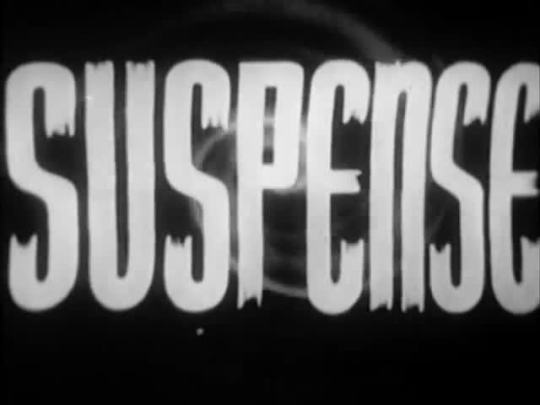


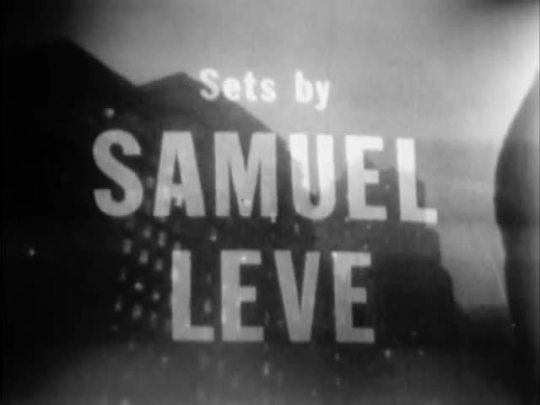


From the Golden Age of Television
Series Premiere
Goodbye New York - CBS - January 6, 1949
A presentation of "Suspense" Season 1 Episode 1
Drama
Running Time: 30 minutes
Rex Marshall as Announcer
Stars:
Meg Mundy as Mrs. Gardner
Gage Clarke as Mysterious Man
Philip Coolidge as Mr. Mason
Ray Walston as Ticket Seller
#Goodbye New York#TV#Suspense#CBS#1949#1940's#Drama#Meg Mundy#Rex Marshall#Gage Clark#Philip Coolidge#Ray Walston#Series Premiere
2 notes
·
View notes
Text
Rules Free Radio Oct 8 2024

Tuesdays 2pm - 5pm EST Rules Free Radio With Steve Caplan bombshellradio.com On this week's Rules Free Radio with Steve Caplan, we've got new music by Librarians With Hickeys, Being Dead, Gary Kaluza, Jake Bugg, Nick Lowe, Billy Strings, Beabadoobee, Naima Bock, Allegra Krieger, Kate Bollinger, Katy J Pearson, and a few tracks from a new collection of songs written by Lou Reed before The Velvet Underground when he was a staff writer for the Pickwick Records label. Tom Petty, Marti Jones, The Grip Weeds, Bruce Moody, The Records, The Whiffs, The Beatles, The Monkees, Davy Graham, Peter & Gordon, The Smithereens, Dave Clark Five, The Kinks, Ricky Nelson, Joe Cocker, and a bunch more. We’ll start the third hour with a set featuring several songs by the late Kris Kristofferson. Being Dead - Godzilla Rises Librarians With Hickeys - Brand New Boyfriend Tom Petty & The Heartbreakers - Listen To Her Heart Bruce Moody - Shy Girls The Grip Weeds - Save My Life Marti Jones - Lonely Is (As Lonely Does) Gary Kaluza - Soft Landing Spot Robby Allen - I Can See Music Mythical Motors - Take A Trip The Whiffs - What They Say The Records - The Same Mistakes The Beatles - I'm Looking Through You Jake Bugg - I Wrote The Book Nick Lowe - Here Comes That Feeling Kaiser George & The Hi-Risers - How Will I Know Dave Clark Five - Can't You See That She's Mine Eddie Angel - Love Is a Swingin' Thing Peter & Gordon - When The Black Of Your Eye Turns To Grey The Smithereens - I Don't Want To Spoil The Party Joe Cocker - I'll Cry Instead Davy Graham - Lost Lover Blues Ricky Nelson - Hello Mary Lou The Monkees - Papa Gene's Blues Billy Strings - Happy Hollow Beverly Ann - We Got Trouble Terry Philips - Wild One NRBQ - It's a Wild Weekend The Kinks - When I See That Girl Of Mine The Len Price 3 - Pictures Jonathan Richman & The Modern Lovers - Roadrunner The Foxes - Soul City The Jaynetts - Sally Go Round The Roses The Beach Boys - Don't Worry Baby Charlie Fink & Luke Treadaway - Satellite Moments (Light Up the Sky) Bon Iver - S P E Y S I D E Badly Drawn Boy - Something to Talk About Cat Stevens - If You Want To Sing Out, Sing Out Jethro Tull - Wond'ring Aloud The Waterboys - Fisherman's Blues Beabadoobee - This Is How It Went Jerry Jeff Walker - Mr. Bojangles Janis Joplin - Me and Bobby McGee Kris Kristofferson - Me and Bobby McGee Kris Kristofferson - Come Sundown The Flying Circus - You Ain't Going Nowhere Kris Kristofferson - Border Lord Rita Coolidge & Kris Kristofferson - It's All Over (All Over Again) Gram Parsons & Emmylou Harris - Sleepless Nights Bonnie Raitt - Love Has No Pride Naima Bock - Takes One Allegra Krieger - Never Arriving Kate Bollinger - In a Smile Katy J Pearson - It’s Mine Now Read the full article
0 notes
Text
DC Comics (CIA Clandestine Unit)
Domestic Intelligence, Deputies Union.
SKI Sheriffs, Essex County.
Opposed, B'nai B'rith, Federal Republic of Germany.
FBI Mossad Detroit (DC Comics; Investor, Massachusetts State Police):
Batman Begins:
Ra's al-Ghul: Andrew Donson, "Dr. Landon DeVry".
Scarecrow: Pasquale Acosta, "Dr. Glen".
Carmine Falcone: John Gotti Jr., "Coolidge Foundation".
Victor Zsasz: Peter Tsaptsaris, "Peebo".
The Dark Knight:
The Joker: Ivan Tomasic, "Beowulf".
Harvey Dent: Matthew Lennox, "Mastershaykh".
The Dark Knight Rises:
Catwoman: Allison Haimes, "Pteryx".
Bane: Jeffrey Lange, "Dr. Leo".
Talia al-Ghul: Lauren Caplan, "Arianna".
Gotham:
Red Hood: Calvin Williams.
Oswald Cobblepot: Andrew Schuck.
Barbara Kean: Cherna Gast.
Cat: Alexandra Rhzanova.
Riddler: Michael Nguyen.
Scarecrow: Ivan Tomasic.
Carmine Falcone: Patrick O'Neill.
Fish Mooney: Jenna L. Williamson.
Azrael: Andrew Brooks.
Tabitha Galavan: Allison Haimes.
Solomon Grundy: Michael Charlebois.
Harvey Dent: Charles Winston.
Pamela Isley: Cassie-Leigh Stock.
Jervis Tetch: William Morgan.
Sofia Falcone: Aubrey Bennet.
Ra's al-Ghul: Philip Goslin.
The Executioner: Cam Hollopeter.
Basilo Carlo: Brian McManamon.
Hugo Strange: BD Wong.
Jerome Valeska: Joshua Moen.
Jeremiah Valeska: Evan Brooks.
Bane: Ryan Gregson.
Nyssa al Ghul: Ruba O'Neill.
Sal Maroni: Jeffrey Lange.
Victor Zsasz: Brian Monaghan.
Firefly: Jessica Bailey.
Ventriloquist: Ban Ki-Moon.
Lazlo Valentin: David "Chet" Charlebois.
Batman (2022):
Carmine Falcone: Anthony Parziale.
Oswald Cobblepot: Lyndon Byers.
Catwoman: Kara Williamson Daignault.
Riddler: Christophe Stevens.
Joker: HJ Carver.
1 note
·
View note
Text
For your consideration, the saga of Philip Coolidge's hat(s).
On February 26, the day of opening night, Sterne reported that Gielgud gave this note:
Oh, I know! Philip Coolidge [the Captain], you do look rather ineffective in the Fortinbras scene. There’s no feeling of the outdoors. Wear a hat.
On March 3, Redfield quoted two of Gielgud's notes sessions, both of which seem to be after the 26th:
To the Captain (Philip Coolidge): “Coolidge, it’s a charming performance, but get yourself a hat. I couldn’t tell you why, but you’re nothing without a hat.”
To the Captain (Philip Coolidge): “Charming performance Coolidge, but the hat doesn’t suit you. Get rid of it.”
Hume Cronyn didn't give the exact context for this anecdote, but the Hamlet cast didn't move into the dressing rooms until February 24, so presumably this was after that:
One day I sat in my dressing room while John struggled to stage a scene involving Claudius and his courtiers. One of these, Voltemand, was played by Phil Coolidge, an accomplished, bony-faced New Englander of considerable experience. Things weren’t going well. The stage picture would not come right. I could hear every shuffle and word of dialogue from onstage through the dressing room p.a. system. John’s voice rose above the rest and acquired a certain frantic note. “No, no, no! It’s terrible—quite terrible. . . . Coolidge, wear a hat!” I nearly fell out of my chair with laughter at this wonderful non sequitur. it was pure Gielgud.
I checked the video. Coolidge did not end up wearing a hat as either Voltimand (which Cronyn spelled, if not wrong, at least differently than the production did) or the Captain.
7 notes
·
View notes